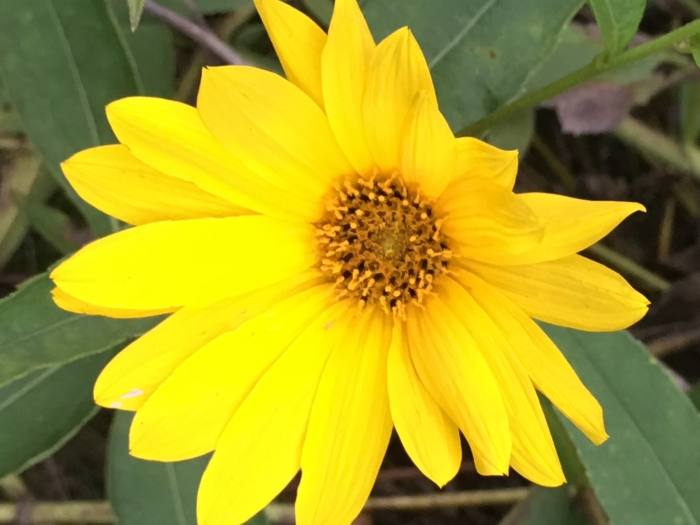Woodland Sunflower
(Helianthus divaricatus)
Woodland Sunflower (Helianthus divaricatus)
/
/

Bobby McCabe
CC BY 4.0
Image By:
Bobby McCabe
Recorded By:
Copyright:
CC BY 4.0
Copyright Notice:
Photo by: Bobby McCabe | License Type: CC BY 4.0 | License URL: http://creativecommons.org/licenses/by/4.0/ | Rights Holder: Bobby McCabe | Publisher: iNaturalist | Date Created: 2018-09-20T22:00:01Z |




















































Estimated Native Range
Summary
Helianthus divaricatus, commonly known as Woodland Sunflower, is a deciduous perennial herb native to open woodlands and forest edges in the Eastern United States and Ontario. It typically grows up to 1.5 meters tall and features lanceolate to oval leaves, 1–8 cm wide with toothed margins. The plant is characterized by its showy yellow flowers, each with 8 to 15 rays measuring 1.5 to 3 cm (0.6-1.2 inches) long, encircling an orange or yellowish-brown central disk. These vibrant blooms appear from summer through early fall, attracting birds and butterflies, and adding a splash of color to the understory.
Woodland Sunflower is valued for its low maintenance and ability to thrive in dappled sunlight, making it an excellent choice for naturalized areas, woodland gardens, and borders. It is also used for erosion control due to its spreading habit. This species prefers part shade but can tolerate full sun in cooler climates. It is adaptable to a range of soil types, provided they have medium to fast drainage, and it has low to medium water requirements once established. While generally pest-free, it can be susceptible to powdery mildew in humid conditions. It’s important to note that this plant can spread aggressively via rhizomes, so it may require management to keep it within bounds in smaller garden settings.CC BY-SA 4.0
Woodland Sunflower is valued for its low maintenance and ability to thrive in dappled sunlight, making it an excellent choice for naturalized areas, woodland gardens, and borders. It is also used for erosion control due to its spreading habit. This species prefers part shade but can tolerate full sun in cooler climates. It is adaptable to a range of soil types, provided they have medium to fast drainage, and it has low to medium water requirements once established. While generally pest-free, it can be susceptible to powdery mildew in humid conditions. It’s important to note that this plant can spread aggressively via rhizomes, so it may require management to keep it within bounds in smaller garden settings.CC BY-SA 4.0
Plant Description
- Plant Type: Herb
- Height: 2-6 feet
- Width: 1-3 feet
- Growth Rate: Moderate
- Flower Color: Yellow
- Flowering Season: Summer, Fall
- Leaf Retention: Deciduous
Growth Requirements
- Sun: Part Shade, Full Sun
- Water: Medium
- Drainage: Medium, Fast
Common Uses
Bee Garden, Bird Garden, Butterfly Garden, Deer Resistant, Drought Tolerant, Low Maintenance, Rabbit Resistant, Showy Flowers
Natural Habitat
Native to open woodlands and forest edges in the Eastern United States and Ontario
Other Names
Common Names: Rough Woodland Sunflower, Rough Sunflower, Hélianthe À Feuilles Étalées, Hélianthe Divariqué, Skogssolros
Scientific Names: , Helianthus divaricatus, Helianthus truncatus, Helianthus divaricatus var. latifolius, Helianthus divaricatus var. angustifolius, Helianthus divaricatus var. divaricatus, Helianthus divaricatus var. scaberrimus, Helianthus divaricatus var. ternatus, Helianthus leiostemon,
GBIF Accepted Name: Helianthus divaricatus L.